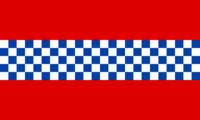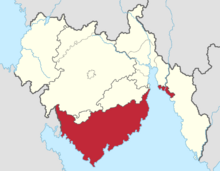Posąvrag language: Difference between revisions
mNo edit summary |
|||
| (One intermediate revision by the same user not shown) | |||
| Line 177: | Line 177: | ||
{{Dazhdinia Navbox}} | {{Dazhdinia Navbox}} | ||
{{Eurth}} | {{Eurth}} | ||
[[Category:Eurth]] | [[Category:Language (Eurth)]] | ||
Latest revision as of 13:23, 19 September 2022
This article is incomplete because it is pending further input from participants, or it is a work-in-progress by one author. Please comment on this article's talk page to share your input, comments and questions. Note: To contribute to this article, you may need to seek help from the author(s) of this page. |
| Posąvrag | |
|---|---|
| Posavian | |
| Посꙙвражщіна | |
 Flag of Posavia | |
| Pronunciation | /ˈpo.sɔw̃ˌvraʒ.ʃt͡ʃiˌnɑ/ |
| Native to |
|
| Ethnicity | Dazhdins |
Native speakers | ~10,000,000 |
| Dialects |
|
| Cyrillic | |
| Official status | |
Official language in |
|
Recognised minority language in |
|
| Language codes | |
| ISO 639-1 | ZD |
| ISO 639-2 | DZD |
| ISO 639-3 | PDZ |
 Location of Posavia within Dazhdinia | |
The Posąvrag language (Dazhdin Latin: Posąvražŝina/Posąvražŝinsky język; Dazhdin Cyrillic: Посꙙвражщіна/Посꙙвражщінскы ѩзык; Posąvrag: Посꙙвражщіна) is a either a seperate language or a dialect of Dazhdin, that is spoken in in Dazhdinia. It is mutually intelligible with Syranik language.
Alphabet
| А а | Б б | В в | Г г | Д д | Ђ ђ | Е е | Ж ж | Җ җ | З з |
| Ѕ ѕ | Һ һ | І і | И и | Ј ј | К к | Л л | Ӆ ӆ | М м | Н н |
| Ӊ ӊ | О о | П п | Р р | С с | Т т | Ћ ћ | У у | Ф ф | Х х |
| Ц ц | Ч ч | Џ џ | Ш ш | Щ щ | Ъ ъ | Ы ы | Ь ь | Ѣ ѣ | Ѥ ѥ |
| Ю ю | Я я | Ѫ ѫ | Ѭ ѭ | Ѧ ѧ | Ѩ ѩ | Ꙙ ꙙ | Ꙝ ꙝ |
TBA
Differences to litarary Dazhdin
There are notable differences to the litarary Dazhdin in orthography, syntax, phonology and grammar:
Disappearance of definite adjective declensions
TBA
Phonetical shift in L's
Лл Ӆӆ
Posąvrag dialects have undergone a phonetical shift /l/ → /w/ for Л, which is to be denoted with a letter El with tail (Ӆ), while the sound change /ʎ/ → /l/ occured as for Љ, which is to be denoted with a letter Л.
This change is expected to have happened during the Posąvrag Syllabic Shift of the 1750's, in which the letters "Л" and "Ӆ" hardened. In transcription of manuscripts, it is advised for "Л" to be denoted as "L" and "Ӆ" to be denoted as "Ł".
Change in orthography in Њ
Нн Ӊӊ
During the same time as the writing of a letters for L changed, letter Nje (Њ) (/ɲ/) changed its writing without changing the sound to the En with tail (Ӊ).
Changes in cases
Almost no presence of the translative case
Animacy
Partial disappearance of the animacy distingtion, merger of "toj" and "ten" pronouns